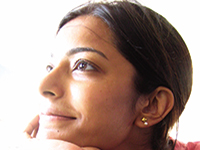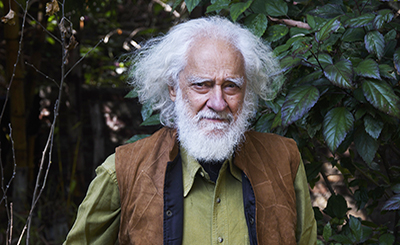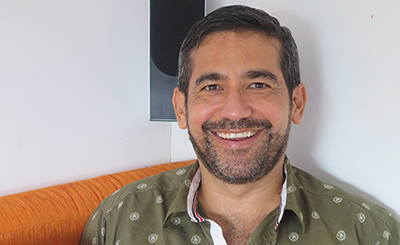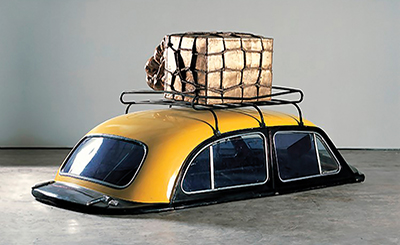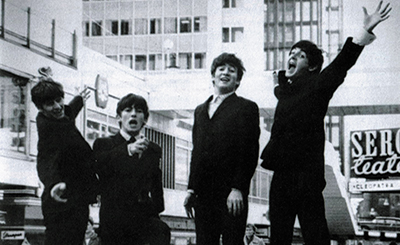Anjali Joseph, 38, is the author of three novels. Saraswati Park (Fourth Estate, 2010), her debut novel set in Mumbai, is the story of Mohan Karekar, a pensive letter-writer living in the fictional housing complex of Saraswati Park, along with his wife, Lakshmi. Their lives change when Karekar’s gay nephew, Ashish, moves in with them. Saraswasti Park was awarded the Betty Trask Prize, Desmond Elliott Prize and the Crossword Book Award. It was also nominated for The Hindu Literary Prize. In 2010, Joseph was also listed by the The Telegraph as one of the 20 best writers under the age of 40.
Her second novel, Another Country, published in 2012, tells the story of Leela Ghosh, a middle-class Bengali girl navigating friendship, love and betrayal as she travels through Paris, London and Mumbai. It was longlisted for the 2012 Man Asian Literary Prize.
Joseph’s third novel, The Living (Fourth Estate), which was published earlier this year, tells the story of Claire, a single mother working in one of England’s last remaining shoe factories in Norwich, and Arun, an elderly man in Kolhapur (Maharashtra) who still makes chappals by hand — in their voices.
Excerpts from an interview:
DEVAPRIYA ROY: Ever since I read Saraswati Park, I was completely besotted by your prose — its finesse, its restraint, its ability to move. In both Saraswati Park and Another Country, I found your portrayal of the inner worlds of the protagonists especially striking, how you managed to employ a peculiar economy to create these minutely drawn microcosms. That’s why I was a little surprised when I found that in your latest book, The Living, you’ve chosen to use two first-person accounts. An infinitely more difficult thing, I reckon, particularly in literary fiction, since when we think about our own pasts — whether distant or immediate — it is through the prism of our obsessions. Also, we work with fragments, with bits and pieces, we go around in circles, and more than anything else, we hardly ever notice our familiar environs. It was a brave experiment, I felt. (A successful one, of course, but you wouldn’t have known that in the beginning!) What, then, drew you to these first-person accounts in The Living?
ANJALI JOSEPH: I really like the way, when writing in the third person, it’s possible to show a character persistently just, as the French say, next to his own life (à côté de sa vie) but not quite in it. The way that the phenomenal world is always trying to seduce us with beauty, and we’re usually distracted by something compelling yet retrospectively tedious, like a love affair or a job or a worry. Nature can be so elegant, but we are like children who choose the wrong birthday present and then are disappointed. On the other hand, I’d written two novels which partly focused on this, in the third person, and I thought it was time to try the first person. I was re-reading the short Beckett texts The Expelled, The Calmative and The End, which are the first things he wrote in French, just after the Second World War. A long time ago, I was thinking about doing some postgraduate study on Beckett in French and in English, something that wasn’t as widely explored then. These stories are a pivotal moment in his work. They’re also delightful. The End, though it’s put at the end of the informal trilogy, is of course the first one he wrote. I felt that it wasn’t only in leaving behind English that he made a sharp right turn, but in leaving behind the third person and beginning to write in the first person. That’s really when he left behind or took a different stance on the things of his past — Croker’s meadows, or the train station. They still reappear but in a different way. Later, of course, he went on to write in no-person, but that’s another story.
DEVAPRIYA ROY: I read somewhere that Henry James’ notes for The Spoils of Poynton are almost as long and as interesting as the final draft of the novel. Some writers I know prepare long CVs for their characters; Satyajit Ray used to make detailed sketches. And then again there are others who conduct all this preparation silently inside their heads. Before you formally begin a novel, what goes on?
ANJALI JOESPH: I’m not really interested in formally beginning a novel, or formally doing anything, if possible. Otherwise it would turn into another type of enterprise, one from which delight swiftly exited. Best to keep things a little illicit, accidental, distracted. That apart, maybe I envisage a completed novel as a journey of sorts, a writer inviting a reader along. The process of writing is more like being one of those land surveyors of the nineteenth century — travelling here and there about the country in order to understand it, but also realising that as soon as you see a person, a festival, an event, and make assumptions about it, you change it, for yourself, and also for the other elements involved. Nothing is going to stay still; eventually you find the happy spot at which to capture things dancing.
DEVAPRIYA ROY: That is an almost perfect metaphor for the novelist’s job. Let me rephrase the question. How do you begin a new work? Maybe, you’ll sort of go back in time to that fuzzy period before Saraswati Park and Another Country and The Living, and walk us through the backstage?
ANJALI JOSEPH: All of them have begun with an image: in Saraswati Park I saw the letter writer at Flora Fountain buying books with marginal annotations at rush hour from a pavement bookseller; in Another Country I had the image of this young woman walking down a Parisian boulevard as the autumn leaves fell very slowly down to the pavement; in The Living I saw Claire, the English protagonist, walking in Lion Wood which is a remnant in Norwich of a very old forest, and still has an odd and distinct feeling of wildness in it; and I had a picture of an older man making Kolhapuri chappals. I don’t invite or construct these images and I often don’t feel equipped to figure them out but I do take the message seriously. Then it’s a case of spending time with this character, reading things, finding out things. For instance, writing Claire, I spent a week in a shoe factory in Norwich, watching people there work and listening to them talk. In part, I drew on things from my childhood in a small town in England. But there were many other things I had to learn about because I grew up in a different part of the country, which doesn’t have the same dialect or landscape or history, and also I didn’t grow up in a working class family or become a mother at seventeen. So I read things, I listened to people, I walked around certain places. The same was true when writing Arun, the Kolhapuri chappal maker.
DEVAPRIYA ROY: Though there are as many kinds of writers as books, I think very, very broadly (the way humanity is divided into Type-A and Type-B personalities, for instance) there are writers who plot everything, till the very end, before they’ve even started a novel — I believe the writer Ann Patchett knows what the last sentence is going to be before she’s typed out a single word. And there are writers who begin somewhere, with a character, a moment, or a possibility, plunge into it headlong, and figure out where it all goes. So the events pan out sentence by sentence. Where are you in this continuum?
ANJALI JOSEPH: I don’t plot in advance, but I often do have a sense of the beginning and the end, and sometimes other points in between. And those might also change.
DEVAPRIYA ROY: Can you write anywhere or do you have a writing room — real or imaginary? Will you describe it for us?
ANJALI JOSEPH: I do have a study now, with a nice desk, the first I’ve owned. It’s more like a table and allows me to sit at it on a chair but with legs crossed, which is important. But, as with the idea of formally beginning or writing a novel, it’s usually more appealing to avoid the study and sit and write on my bed. Still, perhaps as in the case of people who are married but lead another life alongside that, it’s quite nice to have the study in order to avoid it.
DEVAPRIYA ROY: I admire desks and writing tables in every furniture store. I dream of an antique rolltop with a hundred little nooks and crannies that maybe one day I shall actually find — and be able to afford. But I never seem to be able to sit at a desk and write (maybe it’s a late reaction to school). I sit cross-legged on the floor and use low tables. Or I’m on a deadline — and conditions don’t apply. There’s an allied question to the previous one. There is such a strong sense of place in your novels that I am tempted to ask this. Did you write Saraswati Park in Bombay? Or did you have to get away from Bombay to access it as luminously as it comes across on the pages? And similarly — was the Paris of Another Country or the Kolhapur of The Living from memory (and maps) or did you actually write bits there?

ANJALI JOSEPH: I began Saraswati Park while sitting in my bedroom in a small terraced house in Norwich, but I’d been in Bombay for the previous three years. After the year in Norwich at that time I returned to Bombay and was working there while I worked on the novel. I think missing Bombay in the first instance helped, and being back in Bombay helped me not to romanticise too much, even though as a book it is quite in love with Bombay. That is generally how I write too — by falling in love with the person or place or thing I am writing about. And falling in love is perhaps best done in the remove that follows proximity.
DEVAPRIYA ROY: Do you keep to a strict writing schedule — fixed number of words or hours every day? Also, are there any specific writing rituals? Or do you just tell yourself sternly to get down to the bloody pages as a deadline looms?
ANJALI JOSEPH: When I was younger I was tormented by the problem of my own laziness and the fear of drifting towards entropy — you know, just spending a decade in my pyjamas and forgetting to do anything. But that was a ghost story for children, I now realise. I’m not lazy at all. It’s a simple matter of being attentive to the next thing to do. I do write every day, pretty much. I used to write every day as a child, but in a certain dark period in my twenties it became something fraught, because associated with ambition, or failure — there’s no difference, really, between the two, is there? So I had to learn to do it again but now I don’t even think about it.
DEVAPRIYA ROY: Would you say then it has gotten easier? In the sense that it is still difficult, of course, but you are less fraught? Less afraid of that mid-book feeling?
ANJALI JOSEPH: I’m not going to be stupid enough to answer this question directly. But let’s say that everything is getting easier. I think a lot of it is to do with age. I’m one of those people who finds the idea of death really cheering. It’s like the tedium of trying to get interested in revising for your final exams in college versus the last day before one of the exams.
DEVAPRIYA ROY: Growing up, what sort of reading did you do? Were there big readers in the family? Any specific bookish memories? I remember being very charmed by an anecdote about the writer Jamaica Kincaid. While in middle school, Kincaid would get so attached to every library book she ever borrowed and read that she could never bring herself to return the books. So she found some excuse or other and stashed the books under her bed until her fiercely Catholic Mother discovered this theft and took her to task.
ANJALI JOSEPH: Yes, everyone in the family was a big reader. In our flat in the Tata Institute of Fundamental Research (TIFR) in the evening, table lamps would go on and the adults would sit in a pool of soft light and perceptibly disappear into the rabbit hole of a book. The same thing happened in my grandparents’ flat in Bandra. I remember quite a long period of being impatient to learn to read. My mother started teaching me on my third birthday, but I was like one of those American kids who start eyeing the car when they’re five or something.
DEVAPRIYA ROY: They must be very proud that you’re a writer. Do you ever discuss specifics of your books with your parents or grandparents?
ANJALI JOSEPH: I don’t know, actually. And no. My grandparents died a long time ago, sadly.
DEVAPRIYA ROY: What was it like being a child in TIFR? In a time of no television, I imagine?
ANJALI JOSEPH: It was a beautiful campus especially then. There’s a private beach — private because it’s near an outpost of the Bhabha Atomic Research Centre (BARC). There is a grove of, I think, casuarina trees near the sea. At that time there were just a couple of residential buildings and there was a huge garden, and a lot of space. I was one of the younger kids and I spent a lot of time wandering around alone, quite safely, and some time with a large feral group of the younger kids. I did get bullied a bit, probably because of being one of the smallest. And my brother and I got a lot of the, “So, are you a Hindu or a Christian? Love marriage?” type of scorn, because almost everyone else in the colony was a South Indian Brahmin and we were a random amalgam of Malayali-Bengali-Gujarati. But it was a warm place. You could walk into anyone’s house. My brother’s best friend lived across the hallway from us, and his family had a) a carpet (dark red) and b) a television. So we’d go and watch the Republic Day Parade. I remember seeing the one where one of Zail Singh’s soldiers shot himself in the foot. This was the early Eighties. The lending library in Navy Nagar was the big excitement. I used to get out five Enid Blytons on Friday evening and try to not read them all by Saturday. My brother’s class teacher sent home a note asking my parents not to let him read fiction before school because it made him vacant. He was probably sitting in his maths class and being asked about the square root of something while thinking, “I am Aragon, son of Arathorn”. I tried to describe this life to some Indian kids at the Sharjah Book Festival and one of them politely asked me about my “deprived childhood”, which turned out to mean, without television and broadband internet.
DEVAPRIYA ROY: Writers you admired most when you first started writing?
ANJALI JOSPEH: I started writing stories as soon as I could read and write, so it must have been Tintin, comic books (my brother had a subscription to Indrajal comics, and my cousin had a stash of Marvel and DC comics too), and Children’s World, a magazine published by the Children’s Book Trust from Delhi, to which my great-uncle gave me a subscription. I loved that magazine. I felt it was my own private forum for my own very distinct political group which was children. There were all these things that adults would never know I was thinking about, but Children’s World just tapped into them. Important stuff, like the story of evolution told from the point of view of a fish that turns into a lizard and crawls onto land (mistake, if you ask me), or how to cut the stem of a carnation in half and use two jars of coloured water to turn half the blossom pink and the other half blue, assuming your mother would be cooperative and buy you food colouring.
DEVAPRIYA ROY: I remember this magazine. In fact, the first piece I ever published anywhere was a letter in the children’s supplement of The Statesman (called “Voices”) complaining that a poem they had published on so-and-so date was actually a plagiarised version of a poem published in an old issue of Children’s World. I even enclosed proof! But staying on the bookish track, I know this answer would probably change if I asked you this question next month or next year — but which writers are important to you now?
ANJALI JOSEPH: Samuel Beckett, now and always. Other than Mr Beckett, I’m reading Proust in French, very slowly, because I keep wandering off and reading other things in between. Not because I’m bored. It’s just a change of rhythm. Recently I also re-read Alice in Wonderland, and right now I’m re-reading Stella Gibbons’ Cold Comfort Farm. I just re-read Great Expectations. I don’t even care about plot in novels in general, but it’s perhaps the perfect use of plot in a novel: plot as karma. Nothing is wasted. I’m also learning Assamese so in the past year or two I’ve read a few classic short stories, very very slowly, with the help of a teacher.
DEVAPRIYA ROY: And any particular favourites from Indian writing that you’ve read in translation?
ANJALI JOSEPH: I think Pather Panchali, even though it’s not a great translation. It’s such a beautiful book. I’ve loved the Bankimchandra Chatterjee novels I read too. Especially Kapalkundala. I’m learning Assamese, as I said, but in a slightly strange way by reading and writing. My spoken Assamese is really basic, or remedial. So it’ll all take a long time. The only other language I’ve learned is French, and that was from years in school in part, and also a lot of listening to the radio and seeing subtitled films, and reading books most of which I probably didn’t understand for a long time. It’s also nice, because in learning a language you don’t just learn a language, you experience a different world or many worlds. I don’t speak an Indian language properly though I can get by in Hindi and sometimes Marathi and I understand basic Gujarati, so Assamese would be the first one. It’s a lovely, literary, and elliptical language.
DEVAPRIYA ROY: Do you edit yourself obsessively while the work is in progress — or do you let your sentences or chapters breathe until the entire novel is complete?
ANJALI JOSEPH: I do many many drafts, so the thing happens in layers, which at the end aren’t visible.
DEVAPRIYA ROY: In The Living — which has two alternating first-person accounts — did you work on both simultaneously or did you stay with one until the very end, and crafted the frame afterwards?
ANJALI JOSEPH: I wrote the first drafts of each separately, and then I worked on each alternately. The idea of splitting each narrator’s story into two and interleaving them came from my friend the novelist Jonathan Lee.
DEVAPRIYA ROY: When you write, do you share work-in-progress with anyone? Who are your first readers?
ANJALI JOSEPH: It’s tempting to share it with people, but sort of a bad idea, mostly, at least for someone who works in the way I do. It’s nice to have the responses of an editor at the last stages, when it’s almost impossible to see anything anymore, but I don’t know about giving people work in progress. On the other hand, with The Living, I did swap manuscripts once with a novelist friend, Jonathan, and it was very nice to have that sense of a reader during the process. Also, he’s a very nice and tactful person, so he was generally encouraging and that was really nice.
DEVAPRIYA ROY: I never do so myself. I tell Saurav about the characters much as I talk about friends or work acquaintances he’s never met — so he has a vague idea of all these people in our lives. But he reads the novels only once they are published.
ANJALI JOSEPH: I didn’t do so when writing the first two novels and then I did with this one, and it slowed things down, except in the case of Jonathan’s reading, which was great.
DEVAPRIYA ROY: What are some things you have learnt from your editors?
ANJALI JOSEPH: I’ve mainly worked with two, in London. Both were quite young at the time. Neither asked for any significant changes, but I think my present editor, Lettice Franklin, combines diligence and close attention with the odd flash of pure audacity, which is a pretty good combination. In Delhi, Karthika at HarperCollins has always been a kind and encouraging presence. She was the first editor to acquire Saraswati Park, and she also suggested the title for The Living (it was the title of a chapter. I’d wanted to call the novel Shoes, which no one else at all thought was a good idea).
DEVAPRIYA ROY: What constitutes success as a writer for you? I mean, you have won awards and critical acclaim. I don’t mean that. Personally, are you happiest when the writing is going well or when you get emails from readers?
ANJALI JOSEPH: I have had some really nice emails, even the odd real letter — and yes, it’s a small miracle that I could sit in a room and daydream and look out of the window and write something and that a few years later someone finds a book and reads it and feels something related, but also very personal, even feels clearly and correctly that this is his book, and exists only for him at this moment in time, and writes to me to tell me so. That is the operation of magic in the everyday world. Success is a slightly suspect concept, maybe. Winning awards is fantastic, for sure. The money is incredibly useful, and the sanction is nice — and again it’s moving that people I don’t know at all have read something I wrote and it means something substantial to them. But success is a moving target, right? It can be writing something and thinking about it a few hours later and feeling happy, or thinking about something I want to write the next day. Or maybe just enjoying my life as much as I do these days. That does feel like success.
DEVAPRIYA ROY: Are you affected by other people’s appraisal of your writing? Is there anything you feel critics have got completely wrong — about any of your novels?
ANJALI JOSEPH: I’m totally affected, but only for a while. I mean, by nature and by upbringing I’m someone who cares a lot about what people think. It’s generally been very easy to make me feel guilty, or sorry for someone, or whatever, even on the scrappiest of pretexts. If someone tells me I’m a bad writer I will absorb it, for a bit anyway. But more recently I’ve reconnected with that fundamental part of myself that really doesn’t care. A book is an odd thing because it’s only alive while you’re writing it, like a painting is only alive while it’s being painted — think of that Balzac story, ‘The Unknown Masterpiece’ — but it’s after it’s published that people start to say things about it. So a bad review can be like getting an accusatory email from someone you went out with six years ago or something. It’s compelling at the time and then a few days later you wake up and think, Whatever.
DEVAPRIYA ROY: There were many reasons I loved Saraswati Park. One was how you liberated Bombay from the maximum city obsession — almost as though the only way to imagine the city was through these extremes. I loved it about The Living too. The powerfully local impulses as opposed to these “global” themes. How deliberate is this?
ANJALI JOSEPH: Very deliberate. When we live, we live our own lives; we don’t see them as general. That they are also general is another, Flaubertian tragicomedy, but if Flaubert had written Emma Bovary as though she was just a doctor’s wife who had a couple of affairs, got into debt, and killed herself, the book would have been a different, not very interesting book. What is under the label “Madame Bovary”? Similarly, two people are both Indians when they are abroad, but at home they might be a person from Delhi and a person from Bombay and so quite distinct. You and I could, I’m sure, find various people we know in common and while we had that conversation we’d be both making links and slicing distinctions. I could meet another person from Bombay and we’d figure out which schools we went to, where we grew up, whom we’ve worked with, where our parents went to college, et cetera et cetera. I mean, it’s the difference between a poor quality newspaper headline and a good novel, or the difference between Dan Brown and Flaubert.
DEVAPRIYA ROY: You know how there is this debate about men and women writing differently? Do you have a position on this?
ANJALI JOSEPH: Let the transcript show that the witness rolled her eyes.
DEVAPRIYA ROY: These same gendered themes are also carried onto characters. Do you ever feel constrained while writing men? Or is it that you never think that you are writing about/ as a man, only that you are writing Mohan or Ashish or Arun?
ANJALI JOSEPH: There is stuff I think I might have got wrong. I do worry about that. And especially about sex. It was nice a little while ago when I was in Bombay and my friend Lueit in Guwahati was reading a proof of The Living. He sent me a text to say he’d reached a certain bit, where the male protagonist has sex, and Lueit said, “How did you get into the mind of a man?” Sex is a different thing because the public discourse about sex and relationships is feminised, and men experience it in a different way that women usually don’t get to hear about. But, you know, you also see and experience things. Your friends tell you things. On occasion I do a little bit of mind reading. And yes, when writing a male character I don’t think of him as “a man”. That would be woefully generic.
DEVAPRIYA ROY: You’ve lived between cities and books. Where is home?
ANJALI JOSEPH: Actually right now I don’t live between cities so much. I just live in Guwahati. I like my flat and the area which I live in. The climate is muggy; recently I returned from a few days in Shillong, which is much cooler — grey, with gentle rain, kind of English weather in fact — and here in Guwahati at the moment even if you wake up at 5.30 in the morning it’s hot and humid, like a large sweaty man pressing you to his chest in a train. But I don’t care. I’m like, yeah, hug me.
DEVAPRIYA ROY: Umm… why Guwahati? Is it research — or one of those leaps of faith? And when you moved here did you cart all your books too?
ANJALI JOSEPH: No, I didn’t. I had an epic month of packing, and became ruthless after I found out the international shipping rates for stuff. I gave some of my books to friends and the rest to the many charity shops a short walk from the flat in Norwich where I’d been living. Then a few months after I moved here I got a bookcase made, the first I’ve owned, and had fun measuring different volumes and figuring out the shelving. It still has some empty space which is partly illusory since I have a lot of books at my parents’ house or my brother’s flat in England, but it’s also nice. There are some things I’ll cling on to, like all my Beckett in English and French. And there are other things I could let go of and maybe find again one day. I’ve always hung on to all my books, till I moved here, but it’s also sort of liberating to let them go. I mean, you can’t take it with you, right?
There were various reasons I moved to Guwahati, but one of them is that when I first came here two and a half years ago in winter I was really charmed by the part of the city I stayed in — where I now live. I don’t have any family connection with Assam, but I really love the place. Even if I go to another state in the northeast and return, my heart lifts when I cross the border. I’ve no idea why. I suppose living here enables me to be an outsider in a way that apparently I find quite comfortable. On the other hand, I don’t want to be too nice about the northeast in case too many other people from the mainland come here, with their bad manners and their bad music. Don’t come. It’s unsafe: there are man-eating tigers at all the bus stops.
DEVAPRIYA ROY: Doris Lessing writes in her autobiography that she used to go on long, long walks to clear her head. Is there anything like that you do? Exercise? Cooking (like Agatha Christie!)? I don’t know, painting?
ANJALI JOSEPH: Walking, running, yoga, laundry, cooking, buying vegetables, pretending to play the bansuri I bought last year which is in a slightly strange key, studying a little bit of Assamese, day dreaming, going on a trip, wasting time on the internet. But is any of these things designed to clear my head? I don’t feel that I’m only writing when I actually sit and type. The whole process of writing a book is the process of turning into the person who will have written that book, which is not the person who starts writing it. So, my contention is I’m always working, or never working.
DEVAPRIYA ROY: I completely agree. It’s either always working — or never working. Try telling that to people who get the rush hour commute though. I’ve often wondered about how creative writing programmes at university actually work. How did you cope?
ANJALI JOSEPH: I really enjoyed doing my master’s degree. It was nearly 10 years since I’d left college and I’d been working full time. It was very nice to go back to college — have a library — have friends who read books, have time to sit around and drink coffee and think about things. It was the first time I had a whole bunch of writer friends. Maybe it was a little more the way I’d imagined university would be, rather than the way my undergraduate life had been. Another similar experience was going to Uttarakhand for a month to train to teach yoga; that was the first time I hung out with a bunch of people who were on the surface totally disparate, but in one important way the same.
DEVAPRIYA ROY: Your characters are not overly political? Is that conscious? I find a lot of novelists who are also activists — as they well might be — or are journalists, in a sense that their non-fiction is often about politics (in this country, I think 80 per cent journalism is about politics). Do you engage with politics only through your characters?
ANJALI JOSEPH: Arguably the political is also very personal, and everything is related to power. Marriage; love; work. But party politics and big historical events so far haven’t interested me as material. When I read the Sentimental Education I don’t think so much about the revolution; I want to know if Frédéric gets to sleep with Madame Arnoux. And so does he, by the way.
DEVAPRIYA ROY: Is there an idea of truth that you work with — a fictional truth, of course. Is it there somewhere below the bones of the text? Or is it simply language which constructs this provisional truth — changing form as the book changes hands?
ANJALI JOSEPH: I think things have their own specific reality at a certain moment in time. In improvised music, there is a correct note to hit. But you only realise what it was after it’s been sung. On the one hand, I think language is everything, but I also think language is creating the conditions for something that can’t be noted down. What I’m doing when I write is creating a set of signs that will somehow produce magic in a reader — transform him. It’s a preposterous thing to claim to be able to do, and it’s also true. As with anything, the thing is to refine your intelligence so that you are good enough to get out of your own way, and let it happen. Consider a great goal in a football match, or a great concert. It’s inevitable, but only after it happens. This makes no sense, and is true.
DEVAPRIYA ROY: And one final question. Does being a chartered accountant mean you are that rare creature: a writer who manages her accounts and refuses to live beyond her means?
ANJALI JOSEPH: I’m only part-qualified, and I’m one of those people who has to set aside a few days every year to sit and try to make sense of a random bunch of receipts and records to file my tax. Theoretically, I understand that it’s quite simple to be organised.





